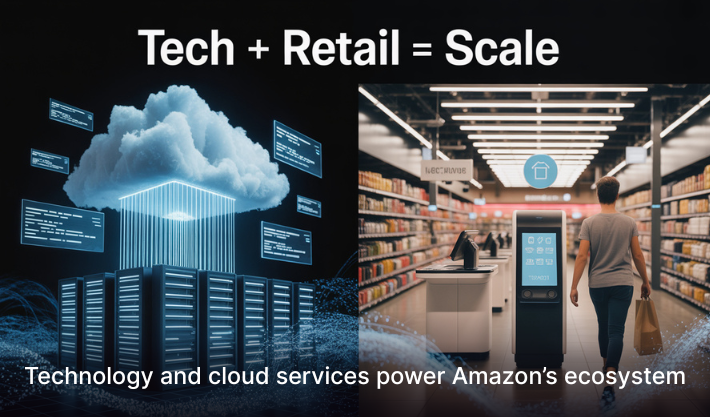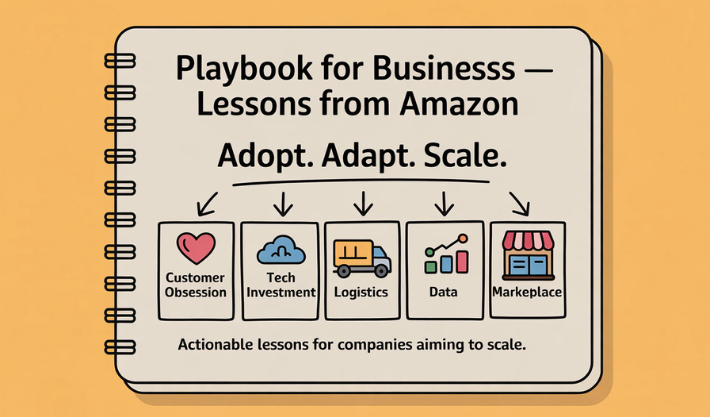

Are you ready to disrupt with AI? Join our Hackathon today! Click to Register
By WebOsmotic Team | Published on August 29, 2024
Summarize Article

Table of Contents
ToggleAmazon’s success is rooted in its unbeatable customer service and vast product selection. In Q2 2023, Amazon’s net sales of approximately 134.38 billion U.S. dollars, up from 121.23 billion U.S. dollars in Q2 2022. This growth demonstrates Amazon’s vision, determination, and innovation, making it the go-to e-commerce platform worldwide.
In the realm of e-commerce, Amazon is the go-to destination for online shopping. Businesses can learn from Amazon’s legendary success story. Amazon’s journey from the beginning to its current status as a global e-commerce titan is a testimony to what can be achieved with vision, determination, and innovation. If you’re wondering why Amazon is best, it’s due to their unbeatable customer service and vast product selection.
Whether you’re a startup eyeing expansion or an established business looking to thrive in the digital age, Amazon’s blueprint offers a treasure trove of insights and strategies. It’s not only because Amazon is a success but also because it holds invaluable lessons for entrepreneurs and enterprises alike.
The e-commerce industry is not just some trend in this digital landscape; it’s the future of retail. With the increased demand for online shopping, it has become necessary for all e-commerce businesses to understand the mechanism of e-commerce expansion for their growth.
Amazon’s story is a roadmap for any business in this competitive era. In this blog post, we’ll understand Amazon’s Scale-Up Success, the Core Principles of Amazon’s Scale-Up Blueprint, and the reasons why Amazon is the leader in B2C. Let’s dig a little deeper into this.


Brief History of Amazon: Jeff Bezos created Amazon as a small online bookstore in 1994, and since then, Amazon has grown into a global e-commerce giant. The company expanded its offerings to include a wide variety of products, such as electronics, clothing, home goods, and more.

Launch Of Amazon:
Amazon launched its marketplace platform in 1999, allowing third-party sellers to list their products on Amazon. It introduced a Prime membership program in 2005, providing members with free 2-day shipping and other benefits. Amazon acquired a physical presence in the grocery market in 2017 through the acquisition of Whole Foods Market. These strategic moves contributed significantly to Amazon’s growth and dominance in the e-commerce and retail industries.
Element Contributing to Amazon’s Success:
Amazon is a successful e-commerce brand due to several factors, including its focus and determination on customer satisfaction, its commitment to innovation, and its ability to scale up the business efficiently. Amazon is known for its excellent customer service, which has no doubt helped to build loyal customers. It constantly innovates and introduces new services, which keeps customers engaged and has allowed it to reach a global audience. These core principles have been pivotal in Amazon’s journey to becoming a market leader..
Amazon’s initial tagline when it started as an online bookstore was “Earth’s Biggest Bookstore.” However, it ended up becoming one of the biggest e-commerce leaders. Amazon has a proven track record of success, and its approach can be used as a blueprint for other businesses that look up to Amazon as inspiration. This ability to adapt and evolve beyond its original vision is a testament to Amazon’s agility and innovation.


Customer-Centric Approach:
Amazon’s undivided attention and unwavering commitment to its customers have satisfied them to the fullest. They prioritize the customer’s needs above all else, constantly providing ways to enhance the shopping experience for their users. Their obsession with delivering value and convenience, from two-click checkout to a user-friendly interface, is evident proof of their continuous effort for their customers, which has, in return, built an army of loyal customers. This customer-centric approach has been a key driver of Amazon’s success.
Innovation and Technology:
Amazon has indeed surprised us with its constant innovation. It has not only performed well in the B2C market but also in B2B. From Amazon Go to Amazon Web Services, it has surpassed other cloud computing platforms, with over 30% of the market share. Their pursuit of new ideas and technologies keeps them at the forefront of e-commerce, setting incredibly high bars for the industry to follow. Amazon’s ability to diversify and excel in multiple sectors showcases its adaptability and forward-thinking approach.
Fulfillment and Logistics Excellence:
The simple definition of logistics is the process of planning, organizing, and managing the flow of goods and services from the point of origin to the point of consumption. Amazon excels in its logistics. Its efficient logistics is one of the keys that makes it so successful. This excellence in delivery fulfillment not only meets customers’ expectations but often exceeds them. Their delivery system ensures the product ordered reaches the customers swiftly and reliably. Amazon’s logistics prowess is a critical component of its customer-centric approach and competitive advantage.
Data-Driven Decision Making:
Jeff Bezos was sure when he said, “The more data you have, the better decisions you can make.” Amazon harnesses the power of data like no other. They analyze vast amounts of customer and service information to make accurate and informed decisions about inventory management, pricing, and personalization. This data-driven approach sharpens their competitive edge and drives continuous improvement and growth in the industry. Data has been a cornerstone of Amazon’s success, enabling them to adapt and optimize their operations effectively.
Marketplace Ecosystem:
Because of Amazon’s e-commerce analysis, the marketplace strategies they create have transformed it into more than just a retailer. Amazon is thriving in the marketplace ecosystem where third-party sellers can flourish. This diverse ecosystem expands when offering products and giving customers unparalleled choices, allowing entrepreneurs to grow their businesses within Amazon’s vast platform. Amazon’s ability to foster a marketplace where sellers and customers both benefit has been a significant driver of its growth and success.
According to Amazon’s press release of Second Quarter Results, Amazon’s net sales increased by 11% to $134.4 billion in the second quarter, compared with $121.2 billion in the second quarter of 2022.
Amazon is an e-commerce leader leading both the B2C (Business to Consumer) and B2B (Business to Business) industries. The company has several factors that have contributed to its success, including:
Effective Marketing and Sales:
Amazon, as an e-commerce giant, uses a variety of marketing channels to reach its target audience. It has a deep understanding of its audience and includes online advertising, search engine optimization (SEO), and email marketing as its marketing channels. The company also invests heavily in customer acquisition and retention, often offering discounts on festivals and special occasions to encourage customers to buy products. This multifaceted marketing strategy helps Amazon maintain its strong presence in the e-commerce market.
Optimized Product Listings:
Amazon’s product listings are carefully optimized to maximize visibility and conversion on the web app. The company uses several factors, such as keywords, titles, and meta descriptions, to ensure that its products are easy to find and purchase. Amazon also uses A/B testing i.e. comparing two versions of the webpage to optimize its product listings for various audiences and devices.
Continuous Improvement and Customer Satisfaction:
As Amazon performs data-driven decision-making, it constantly analyzes and adjusts its marketing and sales strategies to improve its overall results, delivering convenient services to customers to ensure their satisfaction. These determinant efforts by Amazon are the reasons that they lead the e-commerce industry.

Need help building your E-Commerce platform? Consult our experts today.
Amazon is undoubtedly the leader in the e-commerce business. With its core principle and efforts of ensuring customer satisfaction, it has surpassed every other B2C marketplace. The data Amazon possesses is incredibly significant. Thus, their strategies and analysis are more powerful and effective in the business. Amazon no doubt prioritizes its customers and offers them new features and discounts to keep them engaged. Amazon has astonishing customer retention rates. 85% of Prime shoppers visit Amazon at least once a week. Isn’t it remarkable? What do you think about Amazon in the B2C market?
Unlock exclusive insights and expert knowledge delivered straight to your inbox